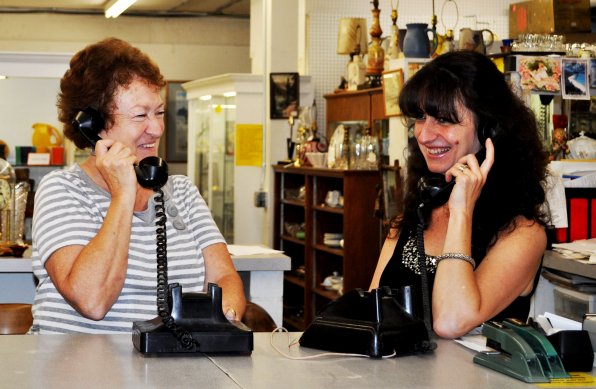Name: Maria Bryant
Co-manager, Concord Antique Gallery
(The gallery features booths of antiques from more than 100 different sellers.)
How did you get started in the antique business?
I've sort of always dabbled in antiques. I did that when my kids were young. The thing I love the most about it is saving these treasures from the past. These things could be in a barn or an attic in a box, but what good are they doing there? We can give it a new life.
I started as a dealer and rented a small space here, and I've been here for 12 years.
Where do you get most of your stuff from?
People come from as far as Massachusetts to sell things in the store. But we get stuff from estate sales, auctions, garage sales. Managers are allowed to buy items from people if they bring them in, but we also pass the contact information on to another dealer if they specialize in what is being sold. Everybody who sells here has their area of expertise.
What does it take to classify something as antique?
Technically it needs to be 100 years old or older, but we're not strictly an antique shop. We also do some home decor and collectibles. We like to say most of our items are 1950s and earlier.
What's the craziest item you've ever bought or sold?
Someone sold a Victorian baby coffin for around $150. At first I didn't know what it was. I thought it was maybe a large document box, but I checked the tag and it said it was an infant coffin.
What is the draw for you in the antique business?
Great customers. I've met some of the best people you could really ever know. Here, it's really like a big family. If I have one regret, it's that I didn't decide to do this 20 years before. I can't ever imagine not doing this.
How many items in the store came from your own house?
Plenty. I think that's how a lot of people end up starting. They look at their own overwhelming collection of stuff and feel like they have to pare down. But what ends up happening in this business is you sell some of your stuff but you buy more and you end up actually expanding your collection instead of dwindling it.
Is it a competitive field?
I don't think so. I think we all work together. If we know of another antique shop in the area, we'll send people their way, and they send people ours. I think the more shops like this in an area the better because it makes it a destination for people who love to shop for antiques.
How do you determine the price of an item?
It mostly depends on what you pay for it. I have customers say they saw the same item in a different booth for a different price, and I say the sellers probably bought it for a different price. Every dealer spends a lot of gas, rent, and time and energy cleaning and tagging their own items, so pricing is always different.
We don't try to get involved in things like eBay pricing. We go by what we can get people walking off the street in Concord, New Hampshire to pay. If we go with eBay prices, you're never going to sell anything. You'd wind up with a museum.
Hidden talent?
This is my passion. My hobby is this.
Guilty pleasure?
Any minute I have I go antiquing. People will sometimes see me in here during my day off and ask what I'm doing and I just say, “more of the same.”
But I also love going to the beach and the ocean.









